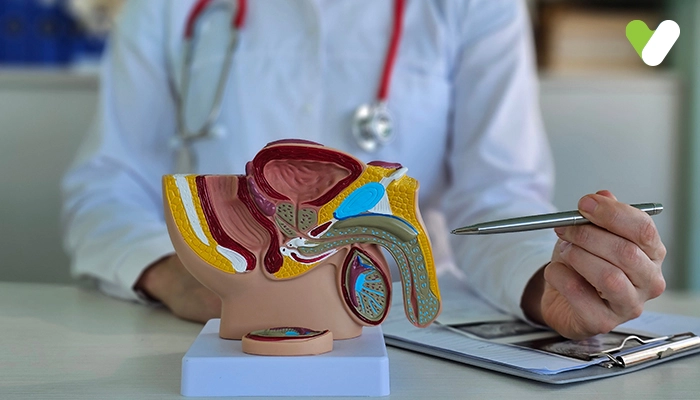Orchitis is an inflammation that occurs in one or both testicles. The prime cause of orchitis is either bacterial or viral infections. Viral infections like mumps are the most common of this orchitis. Sometimes, this happens due to bacterial infections like sexually transmitted diseases.
Orchitis causes testicular pain and swelling. Medications are effective in treating bacterial orchitis and also suppress some signs and symptoms of viral orchitis. It may take several weeks to overcome scrotal tenderness.
Orchitis Symptoms
The symptoms of orchitis develop suddenly and these could be:- Inflammation in one or both testicles
- Painful testicles (mild to severe)
- Fever
- Nausea and vomiting
- Unwellness (malaise)
Very often "testicle pain" and "groin pain" are misunderstood and get interchanged. But groin pain happens in the area between the thigh and abdomen (not in the testicles). Groin pain occurs for different reasons.
Swollen Testicle Causes/Orchitis Causes
Bacterial or viral infections are the prime causes of orchitis. Many times, the experts can't determine the exact causes of orchitis.Bacterial Orchitis
Bacterial orchitis occurs due to the result of epididymitis. Epididymitis is an infection of the urethra or bladder that migrates to the epididymis.Bacterial orchitis may occur due to an STI. Other causes of bacterial orchitis are in-born abnormalities in your urinary tract or having had a catheter or medical instruments inserted into your penis.
Viral Orchitis
Viral orchitis is also caused by the mumps virus. Approximately, one-third of men who contract the mumps after puberty develop orchitis. They develop orchitis after 7 to 10 days of the onset of mumps.When to consult a doctor
If you are suffering from painful scrotum or inflammation in the scrotum and if the pain occurs abruptly, then you must consult a doctor.Multifarious conditions are responsible for testicle pain, and some of them may need proper treatment. Other conditions like twisting of the spermatic cord (testicular torsion) may produce a similar kind of pain that is caused by orchitis. By conducting various tests, your doctor may identify which condition is responsible for your pain.
Risk Factors
Certain risk factors for non-sexually transmitted orchitis are,- Not vaccinated against mumps
- Suffering from recurring urinary tract infections
- Genital or urinary tract surgery
- In-born abnormalities in the urinary tract
Sexual behaviors are responsible for STIs that will enhance your risks for sexually transmitted orchitis. Those behaviors could be:
- Multiple sexual partners
- Intimate with a partner who has an STI
- Sex without any protection
- A personal history of an STI
Complications
Complications of orchitis are:- Testicular Atrophy: Due to orchitis, your testicles may shrink.
- Scrotal Abscess: The infected tissues are filled with pus.
- Infertility: In rare cases, orchitis may lead to infertility or inadequate testosterone production (hypogonadism). You may not get this condition if your orchitis affects only one testicle.
Prevention
To prevent orchitis you may follow the below-mentioned things- Get vaccinated against mumps, the prime cause of viral orchitis
- Never go for unprotected sex as this will protect against STIs that can cause bacterial orchitis
Diagnosis
By reviewing your medical history, your doctor will perform a physical examination to check for inflamed lymph nodes in your groin and an enlarged testicle on the affected side. Your doctor may also conduct a rectal examination to look for prostate enlargement or tenderness.Your doctor might suggest the below-mentioned tests
STI Screen: If there is a discharge from your urethra, a narrow swab is inserted into the end of your penis to collect the discharge sample. The sample will be sent to a laboratory for gonorrhea and chlamydia. Some STI screens are also performed along with a urine test.Urine Test: your urine sample will be analyzed to see abnormalities
Ultrasound: The imaging test is performed to evaluate testicular pain. Ultrasound with color Doppler may reveal whether the blood flow to your testicles is lower than normal (indicates torsion) or higher than normal, which confirms orchitis.
Orchitis Treatment
The treatment methods depend on the causes of orchitis.Bacterial Orchitis Treatment
Antibiotics are recommended to treat bacterial orchitis and epididymal orchitis. If the bacterial infection happens due to an STI, then your partner also requires treatment.Finish the entire course of antibiotics that are prescribed by your doctor, even if your symptoms get suppressed within a few days. This will ensure that the infection is gone utterly.
The tenderness may take several days to disappear. Resting, supporting the scrotum with an athletic strap, using ice packs and taking pain reliever medications will help you to overcome discomfort.
Viral Orchitis Treatment
The treatment methods are designed to relieve the symptoms. Your doctor may recommend- Non-steroidal anti-inflammatory drugs, such as ibuprofen (Advil, Motrin IB, others) or naproxen sodium (Aleve)
- Bed rest and elevate your scrotum while resting
- Cold packs/ice packs
People who are suffering from viral orchitis may feel better within 5 to 10 days. But scrotal tenderness may take several weeks to disappear.
Lifestyle and Home Remedies
To Assuage Discomfort
- Take adequate rest in bed
- Lie down so that your scrotum gets elevated
- Apply cold packs to your scrotum as per the requirement
- Don’t lift heavy objects
What questions should you ask your doctor?
You may ask the below-mentioned questions to your doctor.- What are the prime causes of orchitis?
- What could be the best treatment for you?
- What are the steps that you should take to ease symptoms?
- Should you look for the signs of complications?


